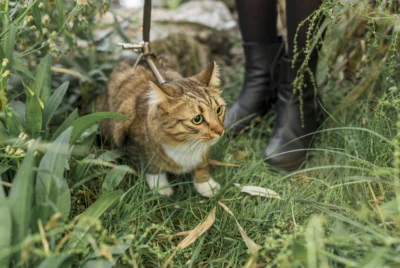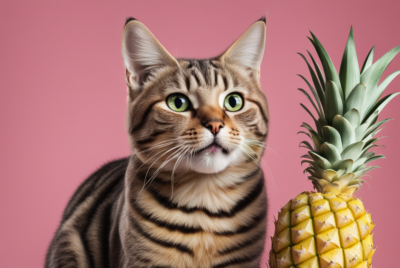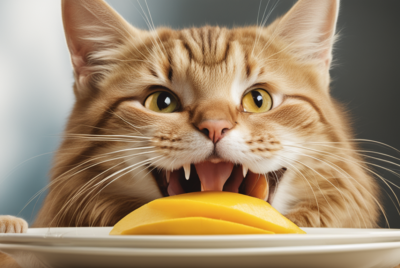Can Cats Eat Bacon Safely? A Guide to Keeping Your Cat Healthy
As a cat owner, you may wonder if it’s safe to share your favorite breakfast treat with your feline friend. Can cats eat bacon without any harm? The topic has long been a subject of debate among pet owners.
In this blog post, we’ll delve into the relationship between cats and bacon, discussing potential health risks and offering guidance on how to keep your cat healthy.
Understanding Bacon and Cats
Cats are obligate carnivores, meaning that they need to eat meat to fulfill their dietary needs. It’s no surprise that many cats are drawn to the enticing aroma and taste of bacon. However, your pet’s health should be your primary concern when contemplating whether to let them enjoy this high-salt, high-fat food.
Although bacon is a source of high-quality animal protein and contains essential vitamins and minerals, the high fat and sodium content found in bacon can be harmful to cats. Feeding your cat too much bacon may have detrimental long-term effects on their health.
As a cat owner, you need to strike a balance between satisfying your feline friend’s craving for bacon and ensuring that they maintain a healthy diet. Understanding the potential health risks of feeding cats bacon and determining the safe amount for them to consume, if any, is of utmost importance.
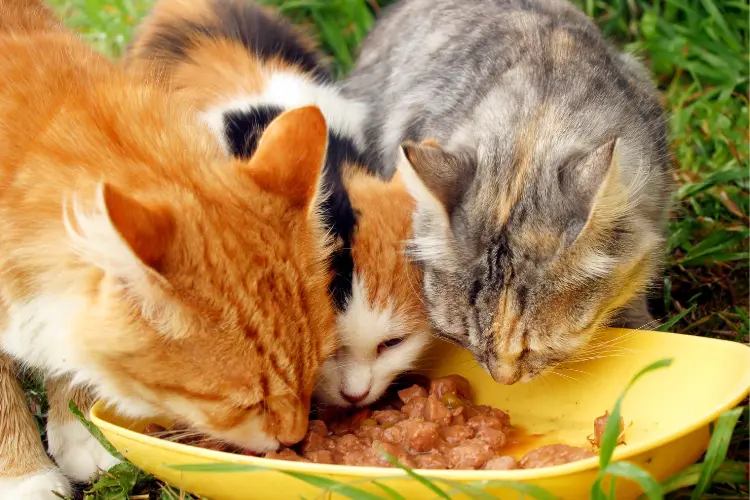
Feeding Guidelines: Can Cats Eat Bacon?
Cats can enjoy small amounts of cooked bacon as a rare treat, but abstaining from raw bacon and controlling portion sizes are vital to prevent health complications. Ingesting seasonings, dressings, and bacon grease can harm cats due to their high-fat content and harmful ingredients such as garlic and onions.
Veterinarians generally do not recommend feeding bacon to cats frequently, as cat treats are a much safer option for regular rewards. It’s best to treat bacon as an occasional treat rather than a staple in your cat’s diet.
Raw vs Cooked Bacon
Feeding raw bacon to cats is not recommended due to the potential for parasites and dangerous bacteria present in pork products unless cooked thoroughly. Raw bacon can contain potentially harmful bacteria such as Salmonella and E. coli, as well as parasites like Toxoplasma gondii.
These bacteria and parasites can lead to gastrointestinal symptoms and food poisoning in cats. Therefore, you must avoid feeding raw bacon to cats to safeguard their well-being.
In contrast, cooked bacon is safer for cats to consume, as the cooking process eliminates harmful bacteria and parasites. However, cooked bacon still contains high levels of salt and fat, which can be detrimental to your cat’s health if consumed regularly or in large quantities.
Turkey, Canadian, and Plant-Based Bacon Alternatives
While pork bacon is the most common type of bacon, there are alternative options available, such as turkey bacon, Canadian, and plant-based bacon. These alternatives may be slightly healthier for your cat due to their lower fat content, but it’s important to remember that they can still be high in sodium.
While moderate feeding of turkey or Canadian bacon to your cat is acceptable, it remains necessary to regulate portion sizes and frequency to avoid health problems linked to high sodium intake. Likewise, plant-based bacon alternatives can be given in small quantities, but it’s crucial to provide these items in moderation due to their high sodium content.

Health Concerns Related to Cats Eating Bacon
Feeding cats bacon can lead to health concerns such as:
- Dehydration
- High blood pressure
- Obesity
- Pancreatitis
- Salt poisoning
The high salt content of bacon, which is often too much salt, can cause dehydration in cats, leading to increased water intake and potential kidney issues.
Additionally, consuming bacon regularly can significantly raise the risk of developing high blood pressure in cats due to the high sodium content in bacon. Sodium has been linked to hypertension and heart disease in cats, so it’s advisable to refrain from feeding bacon to cats to preserve their health.
Moreover, when you feed bacon to your cat, its high fat content can result in weight gain, contributing to obesity and other related health issues.
Being a responsible cat owner entails providing your cat with a balanced diet that caters to their nutritional needs and steering clear of foods that may induce health problems. By doing so, you can ensure that your cat maintains optimal health and well-being throughout their life.
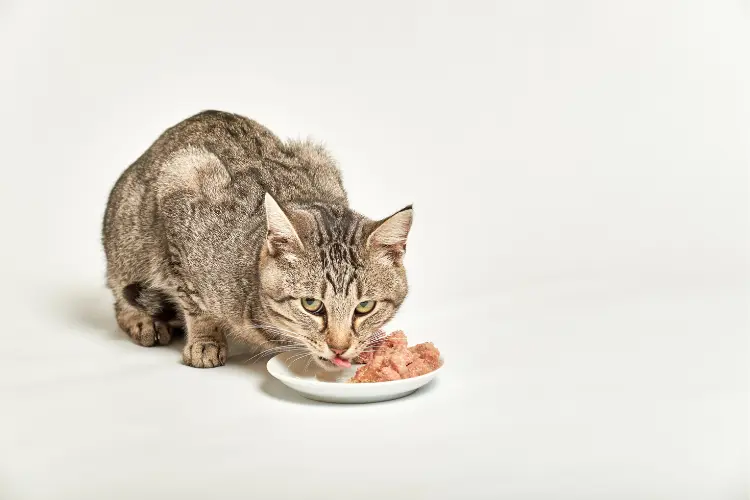
Safe Treat Options for Cats
While many cats may enjoy the taste of bacon, there are safer and healthier treat options available for your feline friend.
In addition to commercial cat treats, you can also create homemade goodies for your cat using safe ingredients that meet their nutritional requirements. Some safe ingredients for homemade cat treats include:
- Tuna
- Whole wheat flour
- Milk
- Vegetable oil
- Egg
- Coconut oil
- Coconut flour
- Cooked sweet potatoes
- Gelatin
By providing your cat with safe and healthy treat options, you can minimize the risks associated with feeding them bacon, as cats can eat bacon, but it’s important to ensure that they receive the nutrients they need to thrive.
Read also: Best Cat Kicker Toys in 2023: A Comprehensive Guide
What to Do If Your Cat Eats Excessive Amounts of Bacon
Should your cat ingest a significant quantity of bacon, it’s vital to monitor them for symptoms of sodium ion poisoning and seek veterinarian advice immediately. Symptoms of sodium ion poisoning in cats may include:
- Vomiting
- Diarrhea
- Decreased appetite
- Lethargy
- Incoordination
- Excessive thirst
- Excessive urination
- Tremors
- Seizures
- Confusion
- Disorientation
- Behavior changes
Seek veterinary assistance if your cat exhibits signs of distress, such as an upset stomach, vomiting, or diarrhea, for a period exceeding 24 hours. Your veterinarian can provide guidance on the appropriate course of action and treatment options for your cat.
Ideally, cats should not consume bacon. However, a small amount of bacon as an occasional treat should not be detrimental to the health of your cat. It’s advisable to abstain from giving bacon as a treat and instead opt for other low-fat, low-salt foods that are safe for your cat to consume.
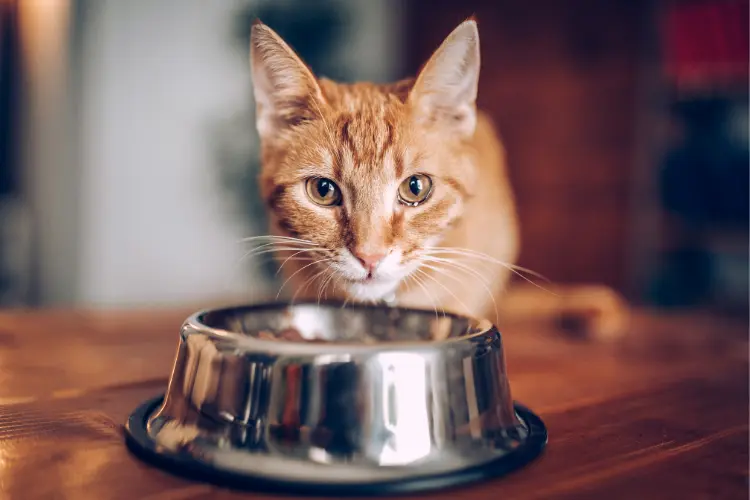
Commercial Cat Food and Bacon Ingredients
While bacon isn’t a common primary ingredient in commercial cat food, some cat treats may contain it in moderation. Bacon-flavored cat products frequently include additives and preservatives that might not suit cats.
Hence, it’s crucial to review the ingredients and seek a veterinarian’s guidance before offering bacon or bacon-flavored items to your cat.
Commercial cat food typically contains:
- Protein sources such as meat and fish
- Carbohydrates such as cereals and vegetables
- Fiber sources, including beet pulp and cellulose
- Essential nutrients, including vitamins and minerals
These ingredients provide a balanced diet for your cat and meet their nutritional requirements.
Expert Advice: A Veterinarian’s Perspective on Cats and Bacon
A consultation with a veterinarian is necessary to gain expert recommendations on safely feeding bacon to cats and maintaining their balanced diet for optimal health. Veterinarians have cautioned that cats consuming bacon may be at risk of developing health issues such as:
- hypertension
- heart disease
- weight gain
- digestive problems
This is due to the high levels of salt and fat in bacon. It’s advisable to avoid feeding bacon to cats as a regular part of their diet.
Although it’s generally considered safe for cats to consume a piece of bacon once a week, bacon is high in sodium and may contain additives that are not suitable for pets. Instead of feeding your cat bacon, opt for low-fat, low-salt alternatives that can provide the necessary nutrients without posing health risks.
Frequently Asked Questions
Can I give my cat a piece of turkey bacon?
It is not recommended to give your cat bacon, whether it’s streaky, back, turkey bacon or even bacon bits. This type of food is loaded with salt, preservatives, and fat which can lead to health issues over time. If you would like to treat your cat, plain, cooked turkey is preferable.
Can cats get worms from raw bacon?
Raw bacon can contain harmful bacteria and parasites that can lead to infections in the stomach and intestinal tract, so it is best to avoid feeding cats raw bacon. It should only be given as an occasional treat, and if fed, it should be cooked bacon rather than raw.
What should I do if my cat eats a large amount of bacon?
If your cat has eaten a large amount of bacon, watch for signs of sodium ion poisoning and seek veterinary advice immediately.
Conclusion
While cats may be enticed by the aroma of bacon, it’s essential for responsible pet owners to prioritize their feline companion’s health and well-being.
While an occasional small piece of well-cooked, unseasoned bacon may not pose an immediate threat, it’s crucial to remember that bacon should never become a regular part of their diet.
Instead, focus on providing a balanced, nutritionally sound cat food that meets their dietary requirements. Ultimately, maintaining your cat’s health is about making informed choices, and this guide has equipped you with the knowledge to do just that.


